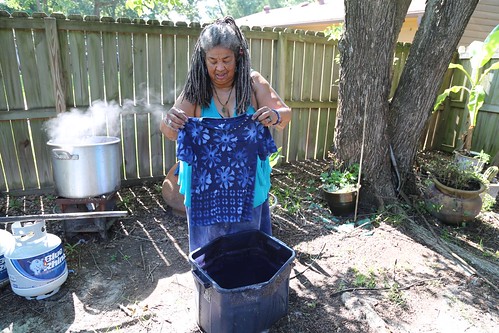Arianne King Comer: IBILE! Ancestral Call in Cloth
IBILE! Ancestral Call in Cloth, is the third iteration of a residency we began with artist and indigo advocate Arianne King Comer in 2017. Once again, Comer will set up a month-long, all-ages, drop-in indigo-dyeing studio, inviting groups and individuals to join her at the dyeing vat as she relates the history of indigo and teaches different resist-dyeing methods, particularly traditional batik, adire (Yoruba), and shibori (Japanese) techniques of designing on cloth. Comer's residency will intersect with be working with Pulang Balik, Kim Khaira's residency that focuses on her personal art practice and work with Milwaukee's refugee communities. Comer's residency will launch at HOME, our family free day celebrating the refugee community.
About the Artist
Textile artist Arianne King Comer is interested in the cultural traditions of the African Diaspora, and much of her research focuses on indigo cultivation and dyeing. Comer travels with wax pans, imprinting stamps from the countries that practice batik, a collection of dyes--including indigo--for cotton and silk, and examples of textiles from her collection. As an indigo advocate, she shares a native South Carolina indigo plant (she left one with us last year that will be transplanted in Lizzie’s garden this summer) and several films on the indigo process in various countries, including the iconic Daughters of the Dust. Indigo has an ancient history and was found in many different parts of the world, but in the 18th century the Sea Islands of South Carolina were a center of indigo production, and Charleston exported vast amounts of indigo. (Along with rice and cotton, indigo formed the basis of South Carolina’s wealth.) Indigo was the foundation of many West African textile traditions, where women, in particular, were known for their dyeing expertise, and enslaved West Africans worked the labor-intensive indigo plantations.
Open Studio Schedule 2019
Wednesday, June 26, 12 noon-7 pm
Sunday, June 30, 12 noon-4:30 pm
Wednesday, July 3, 12 noon-7 pm
Friday, July 5, 10 am-4 pm
Monday, July 8, 12 noon-4:30 pm
Saturday, July 13, 10 am-4 pm

